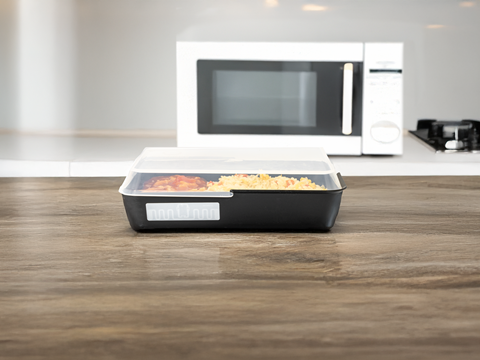
Checkpoint Systems has unveiled Chinook, an RFID inlay designed for reusable food packaging; the solution intends to facilitate supply chain traceability without compromising on microwave safety or durability.
The Packaging and Packaging Waste Directive mandates that all packaging is reusable or recyclable by 2030, on top of banning single-use plastic packaging for particular products within the same time frame.
In response, the patent-pending Chinook inlay is designed to be a ‘rugged and reliable’ solution that maintains food safety and RFID functionality while facilitating reuse for multiple cycles.
It is said to be suitable for various packaging materials, including plastic and glass, as well as for indirect food contact – reportedly complying with existing standards.
Official tests run by the European EPC Competence Center (EECC) have apparently revealed that Chinook maintains over 50% of its maximum read range after 45 microwave cycles under the tests’ predetermined conditions.
“Overall, the Chinook tag from Checkpoint has proven to be a robust and reliable transponder, making it well-suited for applications requiring frequent microwave exposure while ensuring consistent RFID performance.”
Potential end-uses include restaurants, catering services, fast food chains, delivery services, and mass events, with Chinook anticipated to unlock reuse and ‘more efficient’ inventory control.
Checkpoint Systems also recommends that supermarkets and retail chains utilize the inlay, and the full traceability it is designed to provide, to keep track of fresh, frozen, pre-cooked, and bulk products and improve operational efficiency.
The processed food sector is also anticipated to benefit from improved traceability from the product’s point of origin to the end consumer.
At the same time, the new inlay is hoped to reduce packaging waste and promote a circular economy.
In similar news, Avery Dennison has released various RFID inlays and tags in the last year – targeting small pharmaceutical and healthcare items like syringes and vials with the AD Minidose U9XM products, and the automotive, logistics, and industrial industries with its AD Dogbone and AD Squarewave offerings.
It has also applied RFID-embedded labels to individual products sold by The Kroger Co. This partnership aspires for item-level digital identification in order to automate inventories, keep food fresher, and cut down on food waste.
Additionally, brandpack was recognized under the Design category at last year’s German Packaging Awards for its smart home packaging concept. Combining a carton, inlay, and sleeve, the pack was described as a ‘highly flexible and intelligent structure’, with the cardboard inlay doubling as a template to adapt to different heating systems.
If you liked this story, you might also enjoy:
The ultimate guide to the Packaging and Packaging Waste Regulation in 2025
How are the top brands progressing on packaging sustainability?
Everything you need to know about global packaging sustainability regulation in 2025
The key to increasing the use of reusable packaging in supermarkets













No comments yet